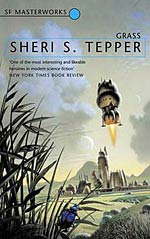
![]() Parnassus Reads
Parnassus Reads
2/9/2014
![]()
I recently picked up Sheri S. Tepper's excellent novel Grass, the first in what is known as the Arbai trilogy. It was originally published in 1989 but doesn't feel dated the way some older SF can. I tried the first two chapters on my kindle and was completely hooked. I had to know what was going on on the planet of Grass, so I called over to my favorite used bookstore to see if they had a copy. Magically, they did.
Off I sped to get it and how quickly I read it once obtained. The initial mystery surrounding the Hunt propels the reader into an unknown but familiar world. Tepper draws on certain elements of our human past to explore the strangeness of the planet Grass. When Lady Westriding is sent there along with her husband as ambassadors with a covert mission to find a cure for the plague sweeping through humanity, the Hunt and it's players become central to the novel. Why does no one have plague on Grass? What are the Hippae? What are the Foxen? What happened to the people discovered in ancient ruins on Grass? These questions and more compel Lady Westriding and the reader forward, deeper into the mysteries of Grass.
The novel maintains the early promise of the first two chapters by doling out pieces of the puzzle that is Grass, but unfortunately, it does not deliver at the finale. Two paragraphs of an info-dump explain the plague, and the horrible mystery of the Hippae is answered long before. I was still reading breathlessly to see what would happen at the end, but it was less satisfying than it should have been.
The most amazing thing about Grass is Tepper's world-building. The world of Grass is fully realized, and it's shown from both the perspectives of its native transplants, who understand their world even less than Lady Westriding, ultimately, and through a foreigner's eyes. It's easy to see her underlying concerns and preoccupations, and there are points where it comes close to preaching. The complex ties to religion (mainly Catholocism), one's personal beliefs, and societal beliefs have a focal point in Lady Westriding's connection to her husband, her changing beliefs and the dual societies of Grass. Her personal dilemmas and growth mirror the changes in Grassian society set off by her arrival; neither of them will emerge unscathed at the novel's close.
Grass is an excellent example of what SF/F can do, and it does what all good fiction should do; it draws the reader in and keeps them there till the bittersweet end. It also creates and maintains a sense of dread and mystery by introducing the Hunt first. Immediately the readers know something bad is going on here, and something even worse is going to happen if they keep reading. As a reader, that is a delicious feeling.